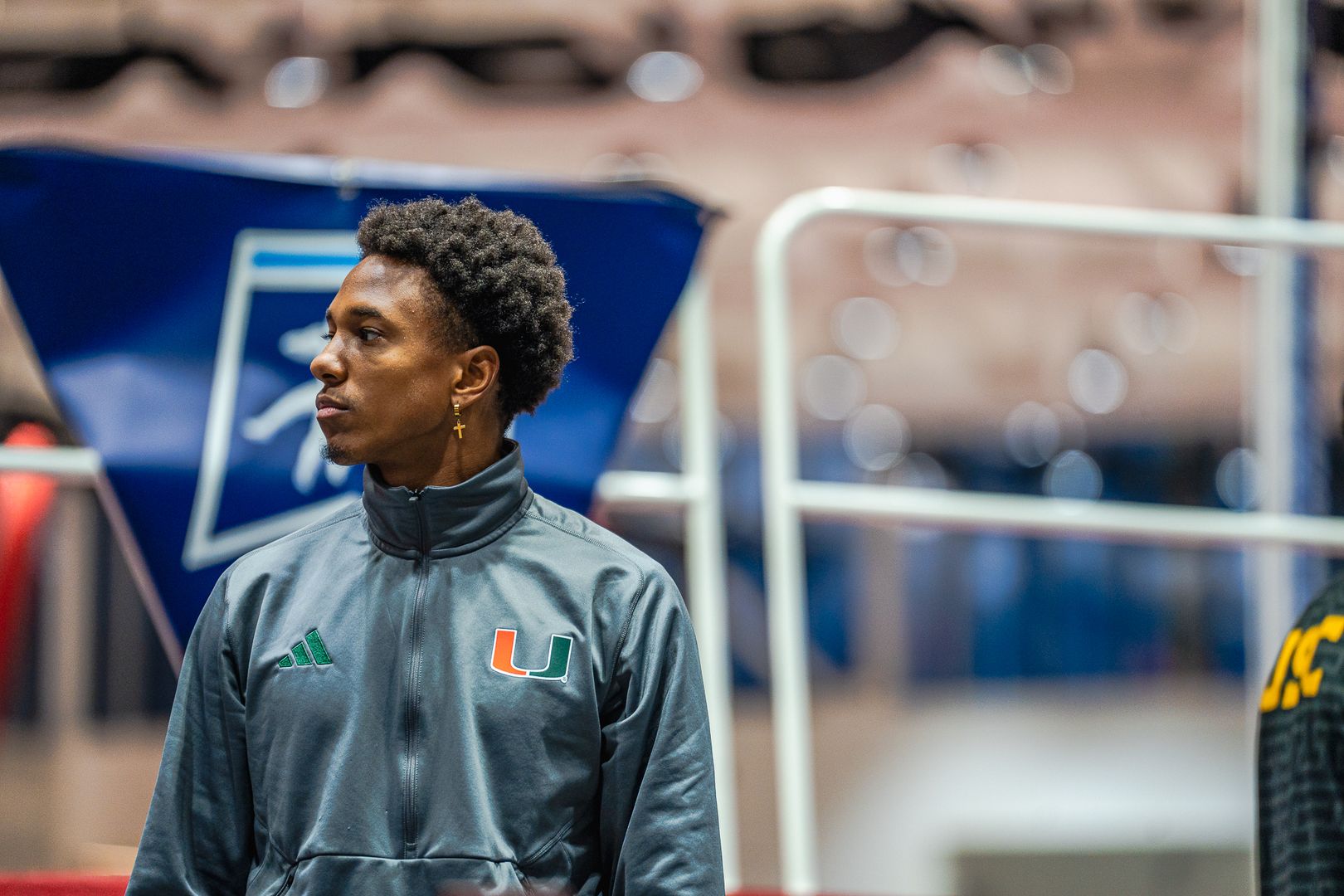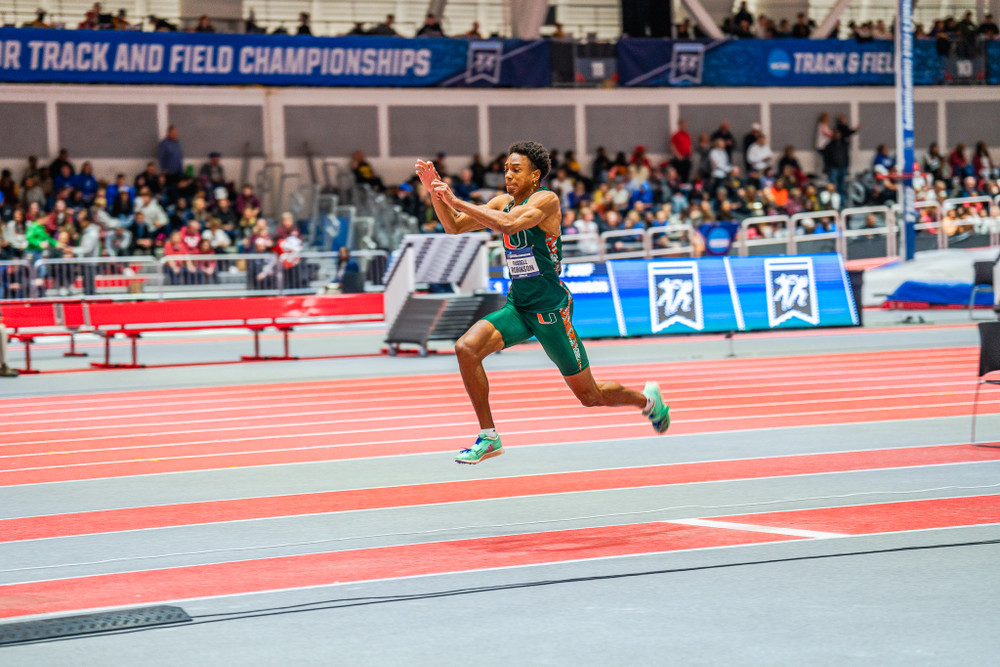
Getting to Know . . . Russell Robinson
This story originally appeared in the Spring 2024 edition of Hurricanes Magazine.
Editor’s note: Earlier this month, Russell Robinson claimed the silver medal in the men’s triple jump at the ACC Outdoor Track & Field Championships with a season-best mark of 16.61m. He is currently one of 23 Hurricanes track and field student-athletes competing at this week’s NCAA East Regional Meet. Robinson will compete in both the outdoor long jump and the triple jump.
Russell Robinson arrived at Miami as a walk-on, not knowing what to expect or even if he’d made the right decision in becoming a Hurricane.
Five years later, he’s a national champion.
Robinson, a senior jumper from Windermere, Florida posted a mark of 16.76 meters in the triple jump at this year’s NCAA Division I Indoor Track and Field Championships in Boston.
He not only set a new facility record at the TRACK at New Balance, but he improved his already-existing Miami record of 16.49m in the process and bested competition from around the country.
Not bad for an athlete who really only embraced track during the latter part of his high school career.
“My freshman and sophomore years in high school, I was just having fun. I wasn’t really taking everything so seriously and I didn’t think I could make a career out of this or go to college for it,” Robinson said. “Then it started getting serious my junior year after I won the district [championship] and I won the regional and I made it to the state championship and went out there and won.”
After that championship performance in high school, Robinson connected with the coaching staffs at Miami and Florida State, both of whom offered him opportunities to join their respective programs as a walk-on.
Robinson settled on Miami, knowing he could make an impact for the steadily improving Hurricanes men’s program.
Now, he’s one of the nation’s best jump athletes and has his sights set on not just finishing the outdoor season with another national championship, but on representing the United States in Paris at this summer’s Olympic Games, too.
“I’m just setting myself up for the summer and training throughout … I’m going to go out and have fun and compete,” Robinson said. “To do that with my teammates who also have a chance of taking their athletics to the next level is a great opportunity for all of us. I’m very excited to see what’s going to happen all season. And we all want more records and personal bests and trophies.”
Hurricanes Magazine asked Robinson to share more about his Miami journey. Here’s what he had to say, in his own words.
Hurricanes Magazine: What was that moment like for you in Boston, winning a national championship?
Russell Robinson: “I don’t know what words to describe it. It was exciting and relieving, especially after watching everyone that could have jumped further on their last jump go on their last round. Then, knowing I’d won, it was a relief. It was very exciting. That would be the word I’d used for this whole thing, actually.”
HM: What was your strategy and your approach going into the triple jump at nationals, knowing you’d be making multiple jumps?
RR: “I was 10th in the order, out of 16 competitors. But out of the top five or six of us, I was the first one in the order. So, my goal was to go out there and put a jump out there and basically, make everybody try and catch me. That’s what I did. I was expecting a far jump, but I was also expecting a little bit more, too. I thought, ‘Now, I have a little more room to grow for outdoor.’”
HM: You came to Miami as a walk-on. What goes through your mind when you think about your journey, going from a walk-on to a national champion?
RR: “All the hard work and dedication that I put in is paying off. It’s not over yet, but it’s starting to show its fruition. Having those guys that I used to train with back in my freshman and sophomore year that were better than me, they motivated me a lot to push myself to get better, faster, stronger, do everything I needed to do on and off the track, to become the best.”
HM: Your numbers have improved steadily, year to year. How would you describe your growth process here at Miami?
RR: “When I first came in, I talked with [assistant track and field coach Rob Jarvis] and we had a plan, a four-year plan to figure things out. I was still very new to triple jump my freshman year, so there was still a lot for me to learn. I trusted the process and the training program. I worked hard on my craft and each year just saw progression and every year coming back after a good season or a good last finish jump, I would tell myself that I didn’t want to be one of those athletes that has maybe a good season here or there and then they just fall off or they don’t do as good the next year. I want to do even better. That was even more motivation to keep pushing myself.”
HM: Going back to high school and your decision to come to Miami, what ultimately made you feel like this was the right place for you, even without a scholarship?
RR: “People hear Miami all over the world and just think of the city. I thought it was a great opportunity. There are so many connections and opportunities down here, athletics, school-wise and career choices. I knew I could go to Florida State, that already had a built-up [track and field] program and they have had guys in the past that have done great things. I could just be another jumper there, or I could come to Miami, which hadn’t always had the best men’s track program in the past and I could come in, get better and help put Miami on the map for jumps. I could create my own history, my own legacy here at Miami. I told myself that before I left that I’d come for all the school records and here I am in my fifth year, and I have almost all of them.”
HM: What’s it been like to work Jarvis and [Director of Track & Field/Cross Country] Amy Deem here, given their experience and the caliber of athletes they’ve coached before you came here?
RR: “It’s been great. … I feel like I have a great relationship with Jarvis where I can come and talk to him about anything track-related, or outside of track and just being able to talk to him about certain things, I think we all have a good dynamic. I’m able to trust their training program and their process … Coming from not a lot of coaching in high school to some of the best coaching here – they’ve shown it over time – is a great experience. They both have great mentors and people they reach out to that have been on the Olympic level as well. They have people they can talk to, and I have somebody I can talk to, and we all work together.”
HM: You mentioned you wanted to come to Miami in part to help see the men’s program grow. What’s it been like to be a part of that growth and see the program take steps forward?
RR: “It feels great, just the team aspect of everything and being there for your teammates when they’re competing and then the same for you. It feels great to have the pieces come together to make this happen. We have a really good chance of being a great [national championship meet] team. We might not have a lot of people, but we have quality athletes, and it feels good to be a part of that squad, that’s building up The U.”
HM: The same week you won the national championship, you also attended the student-athlete career fair and it’s always been important for you to be involved with community outreach and take part in several student-athlete development projects. Why is that so important to you?
RR: “It’s important to show you’re not just an athlete. You’re more than an athlete. You can do other things outside of your sport and it shows who you are as a person, I feel like. It just shows that you’re able to do more, and you’re able to go do what you need to do on the track or on the field. You get in the classroom, and you do everything you need to do academically. And then, you have other stuff, extracurricular outside of those two, that show what a well-rounded person and student-athlete you can be.
“It helps a little bit on your resume, as well and it creates a lot of connections with people that you may not know if they need help in the future down the road, or you might need help from them in the future and just knowing these people and having those connections is a great opportunity.”
HM: As you start to shift your focus from the indoor track and field season to outdoors, what do you want to see from yourself and your team as we move closer to the outdoor championships?
RR: “Now that indoor [season] is over, some of us had great seasons, some of us didn’t. We need to put it behind us and focus on outdoor. We have to keep doing what we’ve been doing and what we do in practice, we need to execute technically at meets. All that work will show. For me personally, of course I want another national championship. But my goal this year is to make the Olympic team, go to Paris and do well there.”
HM: With the Olympics on the horizon, do you feel any pressure or feel a sense of urgency with this outdoor season?
RR: “Not really. I just need to keep doing what I’ve been doing. Out of the USA triple jumpers, I’m one of the top [jumpers], and I have a chance to go and make the team. If I go and compete that day at trials and I jump like I should, then I have a great chance of doing it. So, no. There’s no urgency. I’m just focused on taking it week by week so that when it gets to that point, I’ll be ready to go.”
HM: What would it mean to earn a spot on that Olympic team?
RR: “It’d be crazy. Everybody always has dreams of going to the Super Bowl or the Olympics, depending on whatever sport they went into. I’ve always watched the Olympics, ever since I was young. It’s never been a thing I was like, ‘Dang, I can actually get there.’ But now that I’m getting closer to it, it’s right there within reach and I have a really good chance of getting it, so, I feel really accomplished and satisfied in the moment. But then you know, you’re never satisfied. It’ll be really exciting to do that, to represent my school, myself, my family, my coaches, my team, and my country in a whole other country, competing against the best of the best in the world.”







